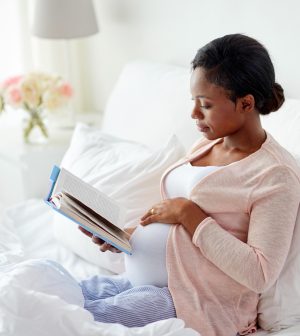- Could Artificial Sweeteners Be Aging the Brain Faster?
- Techniques for Soothing Your Nervous System
- Does the Water in Your House Smell Funny? Here’s Why
- Can a Daily Dose of Apple Cider Vinegar Actually Aid Weight Loss?
- 6 Health Beverages That Can Actually Spike Your Blood Sugar
- Treatment Options for Social Anxiety Disorder
- Understanding the Connection Between Anxiety and Depression
- How Daily Prunes Can Influence Cholesterol and Inflammation
- When to Take B12 for Better Absorption and Energy
- Epsom Salts: Health Benefits and Uses
Many Challenges, But Pandemic Wasn’t All Bad for New Moms

While new mothers have faced many challenges due to the COVID-19 pandemic, it had at least one positive impact, a new survey shows: They were able to have more quiet time with their newborns.
That’s a key finding of the first known study to assess the experiences of U.S. women who had babies in the pandemic’s first six months.
The women reported increased emotional distress, breastfeeding difficulties and unexpected changes in birthing plans. Social distancing and infection control measures fueled increased guilt, isolation and depression, and many new moms weren’t taught how to cope or lacked support, the survey revealed.
“Moms said they felt like no matter what they did, it was wrong,” said study first author Clayton Shuman, an assistant professor of nursing at the University of Michigan in Ann Arbor. While some increase in emotional distress and guilt was expected, he said he was surprised by the extent of it.
New mothers surveyed also reported less assistance with breastfeeding, which resulted in more stress and lower milk supply in some.
“You’d think more time at home would lead to better breastfeeding, but it did not,” Shuman said in a university news release. “Because of the pandemic, many resources weren’t offered or were in a format that wasn’t helpful. Doing a lactation consultation on Zoom was viewed by many as intrusive and uncomfortable.”
COVID-19 also forced some women to switch their birthing plans — for example, having an out-of-hospital birth instead of one in a hospital, or electing to induce labor. One woman whose doula was barred from attending her birth said the situation was “heartbreaking.”
In all, 675 new moms recruited on social media participated in the survey. Most were white and married and delivered a full-term baby.
If there was a silver lining, many women were grateful for the quiet time they had after giving birth due to restrictions on the number of visitors at the hospital and at home, according to the report, which was published recently in the Maternal and Child Health Journal.
Shuman said the pandemic highlighted problems with the United States’ cookie-cutter approach to maternal care.
“Providing a one-size-fits-all approach to maternal care isn’t working,” he said. “Because of mental health issues, we need tailored care — some do well with telehealth but not all. Prenatal and postpartum visit schedules should also be tailored to individuals, especially for new moms.”
More information
For more on pregnancy and giving birth during COVID-19, go to the U.S. Centers for Disease Control and Prevention.
SOURCE: University of Michigan, news release, Feb. 17, 2022
Source: HealthDay
Copyright © 2026 HealthDay. All rights reserved.










